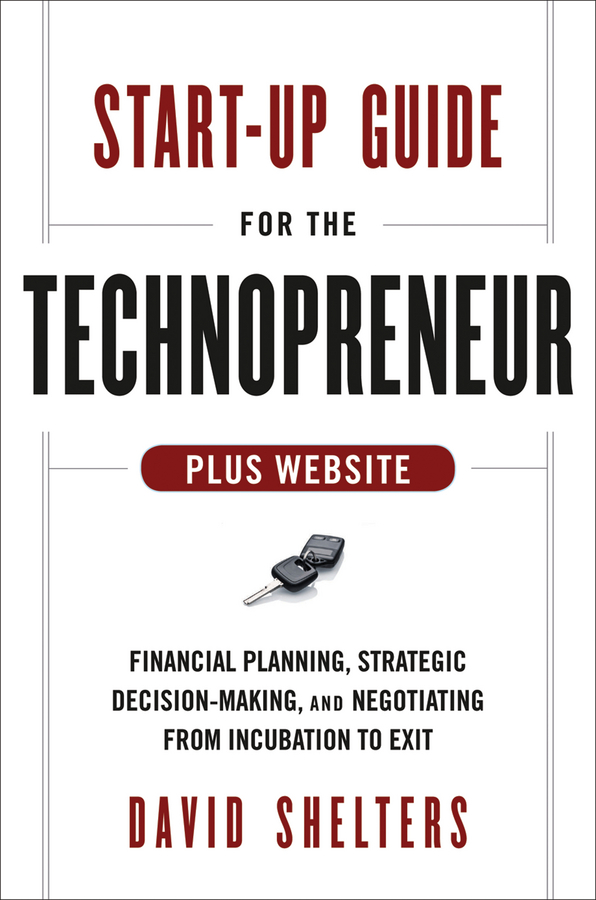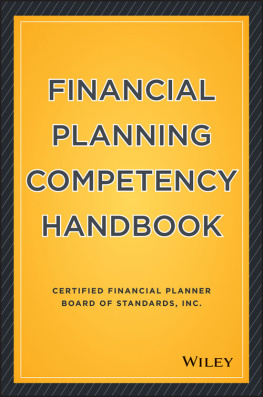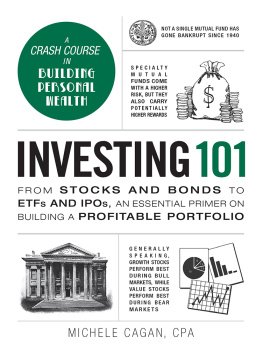
Start-Up Guide for Start-Up Guide for
Financial Planning, Decision Financial Planning, Decision Incubation to Exit
DAVID SHELTERS
Copyright 2013 by John Wiley & Sons Singapore Pte. Ltd.
Published by John Wiley & Sons Singapore Pte. Ltd.
1 Fusionopolis Walk, #07-01, Solaris South Tower, Singapore 138628.
All rights reserved.
No part of this publication may be reproduced, stored in a retrieval system, or transmitted in any form or by any means, electronic, mechanical, photocopying, recording, scanning, or otherwise, except as expressly permitted by law, without either the prior written permission of the Publisher, or authorization through payment of the appropriate photocopy fee to the Copyright Clearance Center. Requests for permission should be addressed to the Publisher, John Wiley & Sons Singapore Pte. Ltd., 1 Fusionopolis Walk, #07-01, Solaris South Tower, Singapore 138628, tel: 6566438000, fax: 6566438008, e-mail: .
Limit of Liability/Disclaimer of Warranty: While the publisher and author have used their best efforts in preparing this book, they make no representations or warranties with respect to the accuracy or completeness of the contents of this book and specifically disclaim any implied warranties of merchantability or fitness for a particular purpose. No warranty may be created or extended by sales representatives or written sales materials. The advice and strategies contained herein may not be suitable for your situation. You should consult with a professional where appropriate. Neither the publisher nor the author shall be liable for any damages arising herefrom.
Other Wiley Editorial Offices
John Wiley & Sons, 111 River Street, Hoboken, NJ 07030, USA
John Wiley & Sons, The Atrium, Southern Gate, Chichester, West Sussex, P019 8SQ, United Kingdom
John Wiley & Sons (Canada) Ltd., 5353 Dundas Street West, Suite 400, Toronto, Ontario, M9B 6HB, Canada
John Wiley & Sons Australia Ltd., 42 McDougall Street, Milton, Queensland 4064, Australia
Wiley-VCH, Boschstrasse 12, D-69469 Weinheim, Germany
Library of Congress Cataloging-in-Publication Data
ISBN 978-1-118-51847-2 (Hardcover)
ISBN 978-1-118-51849-6 (ePDF)
ISBN 978-1-118-51848-9 (Mobi)
ISBN 978-1-118-51850-2 (ePub)
To the worlds best parents:
Dennis and Donna Shelters
Preface
In this book, I share insights and experiences accumulated during my many years as an investment banker, business broker, and financial advisor to numerous entrepreneurial ventures. My aim is to assist entrepreneurs in strategic planning, fundraising, negotiations, organization, and financial decision making with the hope that those aspiring entrepreneurs may sufficiently and efficiently fund their enterprises through progressive stages of development and ultimately achieve optimum financial success with a highly profitable exit. My intention is to prompt entrepreneurs to think finance and strategy in a holistic manner and within the appropriate context by discussing the various stages typical entrepreneurs face from incubation to exit.
The inspiration behind this book is my personal interest in empowering entrepreneurs to realize their full creative potential and achieve maximum profit from their hard work, sacrifices, and intellect. My goal is to provide effective mentoring to entrepreneurs so they may avoid the dangers inherent in business start-ups in general and dealing in the realm of venture capital in particular. Too many times I have witnessed start-ups with very promising and innovative products fall victim to financial starvation. I have also witnessed many instances in which venture capitalists (VCs) take advantage of entrepreneurs vulnerable financial position and financial inexperience and impose terms that ensure that the VCs, not the founders, reap a disproportionate share of the profits. Other times VCs impose such suffocating control as to impede the innovative energies and development efforts of the founding partners, resulting in either underachievement or eventual failure of the venture.
I currently conduct a Finance for Geeks presentation series at tech conferences throughout Southeast Asia. This has given me the opportunity to meet numerous bright entrepreneurs from varied backgrounds who are extremely interested in the financial dimensions of starting and operating a start-up. I am constantly impressed with the passion and innovative ideas that are shared with me. The entrepreneurs lack of experience or knowledge in financial matters also is striking. I always leave these conferences feeling that so many promising entrepreneurs would benefit enormously from engagement with an experienced mentor. Several attendees urged me to publish a book based on my presentations. I am grateful for such encouragement and the opportunity to serve as a mentor to a larger audience.
This book is unique in several ways. No other books examine the issues specific to entrepreneurs in a comprehensive manner. Indeed, entrepreneurs would be wise to consider this book a primer before reading books that examine more specific areas, such as venture capital, writing a business plan, and negotiating term sheets. Reading this book first should enable entrepreneurs to more effectively comprehend, synthesize, and place in proper perspective the information in these follow-up books. The purpose of the book is not to provide all the answers or a blueprint for success. Rather its aim is to stimulate readers to think in strategic terms. Another unique feature of this book is it is based almost exclusively on practical experience. I am not an expert on the academic discipline of entrepreneurialism and am not qualified to compose a treatise on that topic. Indeed, the material in this book may run counter to academic dictates in some areas. However, I strongly believe that experience trumps theory in illuminating a path of success for entrepreneurial ventures.
This book is not an instruction manual but a thought-provoking and enlightening mentoring/coaching instrument. It poses more questions than it answers. However, the right questions must be asked before answers are to be sought.
The standard definition of mentor is an experienced advisor offering personal guidance and support. A mentor serves as a coach, helping others to learn, rather than teaching them, to maximize their own performance. My definition of mentoring is very simple: Mentoring helps people discover how to think and what to think about. The ideal mentor is someone who can accomplish this by imparting personal experiences of both success and failure.
Often aspiring entrepreneurs express a desire to hear success stories. Although it is important to read about and try to emulate successful entrepreneurial venturers, successful entrepreneurs faced critical situations where they had to improvise, endure, and triumph. Every entrepreneurial venture that I have been involved in faced failure at some point. Failed entrepreneurial ventures offer just as valuable, if not more valuable, lessons.
Being a successful entrepreneur requires being a jack-of-all-trades. Many start-ups have founders with a passion for and expert knowledge in their particular innovative product or service but are inexperienced in and possibly intimidated by the financial aspects of starting, growing, and profitably exiting a business.
Next page





